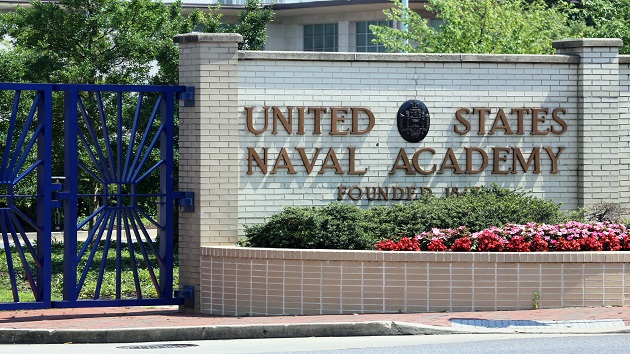
(ANNAPOLIS, Md.) — At the U.S. Naval Academy, it’s not what’s on the shelves that’s drawing attention — but what’s missing.
The institution’s Nimitz Library has been stripped of 381 titles, according to a list published in the New York Times, including works exploring race, gender, and national identity.
The culling includes “I Know Why the Caged Bird Sings” by Maya Angelou, “How to Be an Antiracist” by Ibram X. Kendi, “Bodies in Doubt” by Elizabeth Reis, and “White Rage” by Carol Anderson. None was banned outright — just rendered “not immediately available,” a Naval Academy spokesman, Cmdr. Tim Hawkins, said. The books, he said, had been placed in a room where patrons could no longer access them.
President Donald Trump’s Jan. 29 executive order titled “Ending Radical Indoctrination in K-12 Schooling” has been extended to cover the country’s military academies. With language targeting what it called “discriminatory equity ideology” and “gender ideology” — which he later called “the tyranny of so-called diversity, equity and inclusion policies” — the order set in motion extensive removals, reviews and institutional confusion.
“There isn’t any clear criteria,” Katherine Kuzminski, director of Studies at the Center for a New American Security, told ABC News. “It leaves leadership scrambling — how do we ensure compliance without being accused of overcorrecting?”
Kuzminski said military leaders, bound by a strict code to obey lawful orders, are grappling with what she called the ambiguity of the policy. “Particularly in the Air Force,” she noted, “when the Tuskegee Airmen learning module was removed from basic training for a few days, leadership was trying to follow through with the best of intentions.”
Department of the Navy leadership determined which books required removal at the Naval Academy library, Hawkins told ABC News.
Initially, officials searched the Nimitz Library catalog, using key word searches, to identify books that required further review, Hawkins said. Approximately 900 books were identified during the preliminary search, he said, and department officials then closely examined the preliminary list to determine which books required removal to comply with directives outlined in executive orders issued by the president.
That ultimately resulted in nearly 400 books being selected for removal from the Nimitz Library collection, he said.
Historians and former military officials told ABC News the implications are chilling. Richard Kohn, a military historian and former chief historian for the Air Force, sees the move as a “cleansing” effort. “It reveals a certain kind of weakness in the current administration’s confidence,” he said. “They’re determined to appeal to their MAGA constituency by rolling back decades of progress on race, religion, and diversity.”
For Kohn, removing these books from the shelves sends a clear message to cadets: To get ahead in the military, avoid certain ideas.
Retired U.S. Air Force Col. Thomas Keaney, a senior fellow at Johns Hopkins School of Advanced international Studies, spoke about how far the academies have come — and how far he said they risk falling back. “When I was there,” he said, “it was a whites-only institution,” he said of the U.S. Air Force Academy. “It was the poorer for it.” Education, he insisted, is about exposure. “You are not harming people by letting them read,” he said.
In a letter to the secretaries of the Army, Navy, and Air Force, Democratic Reps. Adam Smith and Chrissy Houlahan called the book removals “a blatant attack on the First Amendment” and “an alarming return to McCarthy-era censorship.”
They demanded to know who ordered the removals, the process used and which titles were being purged, while urging an immediate halt.
The academies have issued carefully worded responses — or none at all — when asked by ABC News for comment.
The U.S. Merchant Marine Academy did not respond to repeated requests. The U.S. Naval Academy, U.S. Air Force Academy and U.S. Coast Guard Academy issued brief statements affirming compliance with executive orders but offered few specifics.
“The Coast Guard Academy is conducting a comprehensive review of its curriculum to ensure compliance with all executive orders,” a spokesperson said.
The U.S. Naval Academy spokesman confirmed that “nearly 400 books” had been removed from its Nimitz Library, explaining the move as an effort “to ensure compliance with all directives outlined in Executive Orders issued by the President.”
He emphasized what he called the library’s robust collection — some 590,000 print books and thousands of academic resources — framing the book removals as minor compared to the size of the overall collection. “The Naval Academy’s mission,” the spokesperson added, “is to develop Midshipmen morally, mentally and physically … to prepare them for careers of service to our country.”
At the U.S. Air Force Academy, a spokesperson noted that a curriculum review was underway “to ensure our compliance with executive orders.”
But outside voices in military academic circles warned that the issue goes beyond compliance, saying it strikes at the core of intellectual development.
“You can’t make ideas safe for people, but you can make people safe for ideas,” said Kohn, who specializes in civil-military relations. “If you don’t mentor students in the academies to understand what’s going on in American society, you don’t really educate them.”
Keaney, the former U.S. Air Force officer, was more circumspect but equally concerned. “I don’t think anyone is going to be hurt by reading anything — however nutty or outside their own culture it is,” he said. “You’re not harming people by exposing them to ideas. On the contrary, you’re training them to be discerning leaders. Give them a chance. Don’t leave them to deal from ignorance.”
Copyright © 2025, ABC Audio. All rights reserved.
